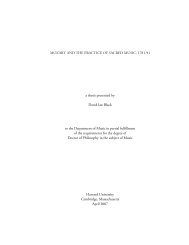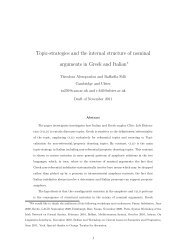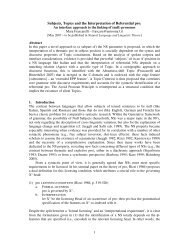Provisional Drogereit pdf
Provisional Drogereit pdf
Provisional Drogereit pdf
Create successful ePaper yourself
Turn your PDF publications into a flip-book with our unique Google optimized e-Paper software.
Scribe Aethelstan A (p. 361)<br />
Charters 92 :<br />
C. S. 677 0 ; 674; 689; 691; 692; Flebilia fortiter-Proem. C. S. 702 0 ; 704; 745;<br />
Fortuna fallentis-Proem.<br />
The style of our scribe is completely individual. He has a style that is rich in words<br />
and idiom and adorned with imagery. At times he can hardly be translated 93 . Even<br />
later we find genitive attributes and rarely used words, mostly of Greek origin, but it<br />
is to such an extent that every sentence of the Proem is adorned with embellishments,<br />
with extensive use of the genitive. Pleonasm characterise him as well as the position<br />
of the words in the article: adjective a – adjective b: noun B – noun A. The Anglo-<br />
Saxon noun style is now more pronounced than anywhere else 94 . In the Proem C. S.<br />
677, for example, we have only two modified verb forms in 84 words, yet on the other<br />
hand there are frequently inflected participles, gerundives and gerunds. Ae. A adorns<br />
the splendid but dark language with the cursus (i.e. prose rhythm), which, however, is<br />
not always well done. As a further embellishment he used the internal rhyme, which<br />
usually joins the most significant words in the sentence. At the beginning he uses the<br />
stock rhyme: “Flebilia fortiter” and “Fortuna fallentis”. “These two embellishments of<br />
beautiful speech, rhyme and alliteration, much loved by the Irish, also play a major<br />
role in the Latin poetry of the Anglo-Saxons” 95 . The fullness of the pictures, the visual<br />
effect, the avoidance of the simple thought are also in keeping with the language. The<br />
style has a poetic quality.<br />
Examples of:<br />
Rare words: totillo (titillo); latratus; foetidus; nausea; peripsema; quisquiliae;<br />
omnipatrans; stridulus; salpinx; soma; ima; tanaliter 96 (meaning?); organum etc.<br />
Pleonasm: C. S. 677: peripsema quisquiliarum; infinite letitiae iucunditatem; C. S.<br />
702: lacteo candore; fellita amaritudine.<br />
92 In the comparison of diplomatic all non-suspect charters that we can assign to Ae. A are also<br />
included. The originals are distinguishable by a small superscript o (e.g. 677 0 ).<br />
93 Napier and Stevenson, Crawford Charters (for one charter assigned to him at a later date), p. 65:<br />
“The turgid proem…” or “The phraseology of the present charter is so inflated, that frequently the<br />
sense can only be made out with difficulty.”<br />
94 In his published paper (Göttingen 1932) on the characteristics of Anglo-Saxon grammar, Dr. G.<br />
Weber indicated this heavy use of the nouns and participles contrasted with the omission of verbs and<br />
adjectives.<br />
95 W. Meyer from Speyer, Die Verskunst der Iren in rhytmischen lateinischen Gedichten, in<br />
Nachrichten der Königlichen Gesellschaft der Wissenschaften, Göttingen, Phil.-hist. Klasse 1916, p.<br />
635 (The art of verse of the Irish in rhythmic Latin poems, in news of the Royal Society of Scientists).<br />
It also included the following on style (p. 630): “Der hochtrabenden……sehr angemessen.” (“Multisyllabled<br />
words are very appropriate to the high-faluting and long-winded Anglo-Saxon method of<br />
expression.”<br />
96 This word “tanaliter” normally appears only in hymno q. d. Bethmanni (see R. Ehwald, Aldhelmi<br />
Opera, in M. G. H. Auctores Antiquissimi XV. p. 509 [2]).<br />
361
















